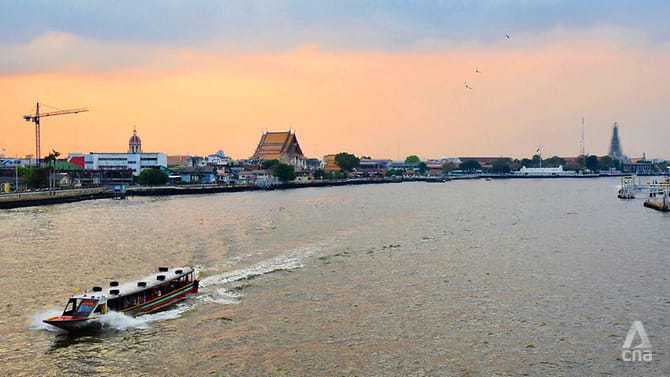Bangkok and 9 provinces in lockdown from Jul 12 as COVID-19 cases surge, curfew imposed from 9pm onwards
10 July, 2021

Bangkok and nine provinces will go into lockdown from Monday (Jul 12) as COVID-19 cases continue to surge in Thailand, the Centre for COVID-19 Situation Administration (CCSA) announced on Friday.
Residents in Bangkok and its nearby provinces of Nakhon Pathom, Nonthaburi, Pathum Thani, Samut Prakan and Samut Sakhon, as well as those in Narathiwas, Pattani, Songkhla and Yala in the far south have been advised to stay at home from Monday and only go outside when it is necessary.
According to CCSA assistant spokesperson Apisamai Srirangsan, a curfew will be imposed between 9pm and 4am in these ten provinces as the government tightened restrictions in high-risk areas. However, residents will still be able to leave their homes in case of emergency, work or medical visits.
Educational institutes in these provinces are required to conduct online classes only, Ms Apisamai said, adding that checkpoints and patrols will be set up by security units to ensure public movement is minimal.
For Bangkok and its nearby provinces, convenience stores and markets will need to close from 8pm to 4am. The government also ordered temporary closure of department stores and community malls in these six provinces, except the supermarket and pharmaceutical sections, restaurants and cafes, banks, as well as areas designated for the national vaccination programme, which will be able to operate until 8pm.
“Eateries can stay open until 8pm but it needs to be stressed that these venues won’t be allowed to offer dining-in services or alcohol. Only takeaway services will be permitted,” said Ms Apisamai.
“Venues reportedly prone to infection will need to close. These include massage and spa businesses and beauty centres,” she added.
From Monday, both public and private sectors in Bangkok and nearby provinces are required to implement maximum work-from-home rules while public transport will see restricted services. Social gatherings will also be limited to five people in these areas.
NEW VACCINATION PLAN FOR AT-RISK GROUPS
Thailand is facing the worst wave of COVID-19 infections, which has put an enormous strain on its healthcare system and medical personnel. The daily case numbers have been in the thousands for several weeks amid reports of the highly contagious Delta variant of the coronavirus.
The country has recorded 288,643 cases and 2,440 casualties since a third wave of infections began in April, when a cluster was found at high-end nightclubs in Bangkok.
On Friday, CCSA reported 9,276 new cases and 72 new deaths. Bangkok and nearby provinces alone accounted for 4,754 cases or 51 per cent of the new infections, excluding those in prisons.
The national tally is now at 317,506, with 2,534 deaths.
According to Ms Apisamai, the Public Health Ministry will adjust its vaccine distribution plan to better cover at-risk groups in Bangkok and surrounding areas, such as individuals above 60 years old and those with chronic diseases.
“One million doses are expected to be administered within two weeks,” she said.
More locations will also be set up to carry out COVID-19 tests and speed up disease detection in communities, she added.
On Friday, CCSA reported 74,895 patients are receiving medical treatments for COVID-19 in medical facilities nationwide and 2,685 of them are in critical condition.
DELTA VARIANT ON THE RISE IN THAILAND
Thailand is monitoring three coronavirus variants of concern, including Alpha, Beta and Delta. They were first documented in the United Kingdom, South Africa and India respectively.
Based on data from the Public Health Ministry, the Delta variant is fast spreading in the country, especially in Bangkok, where it made up 52 per cent of new infections between Jun 28 and Jul 2.
Although most domestic cases in the latest wave carry the Alpha variant, Thai health officials at the Medical Sciences Department found its transmission is in decline while that of the Delta strand increases every week.
In a press briefing on Thursday, public health permanent secretary Kiattiphum Wongrajit said the infections are increasingly spreading from Bangkok and its vicinity to other parts of Thailand. Growing demand for COVID-19 tests as well as medical treatments in hospitals have also resulted in exhaustion among healthcare professionals, he added.
“The Public Health Ministry is trying to come up with measures that would best control the disease,” Kiattiphum told reporters.
Besides the partial lockdown, the ministry also proposed rapid antigen testing and home isolation.
According to Mr Kiattiphum, COVID-19 tests in Thailand are usually carried out with the RT-PCR method, which requires longer evaluation time. Moreover, he added, potentially infected patients could spread the disease to others while waiting for the test result.
“We’ve reached an agreement that we’ll use rapid antigen tests to support the disease examination. Initially, we’ve approved its use at registered medical facilities,” said Mr Kiattiphum, adding they would also be available for home use too.
As the new wave of COVID-19 spreads across Thailand, a shortage of hospital beds has posed a great challenge for its public health system.
Many infected patients have not been able to access medical treatments at hospitals and some of them lost their lives while waiting for hospital beds.
The COVID-19 pandemic situation in Thailand has raised questions about the government’s plan to reopen the country to international travellers in October.
The target was set by Prime Minister Prayut Chan-o-cha, who said at least 50 million people in Thailand should already have received their first dose of a vaccine by early October.
So far, about 8.8 million people have received their first dose of the COVID-19 vaccine and 3.18 million have been fully vaccinated, according to the Disease Control Department.
Source:
